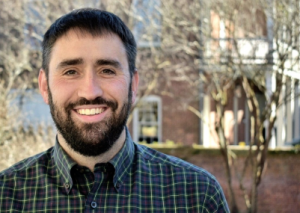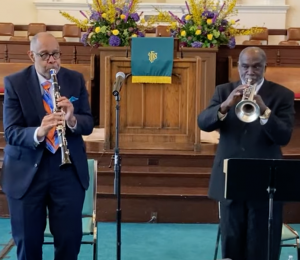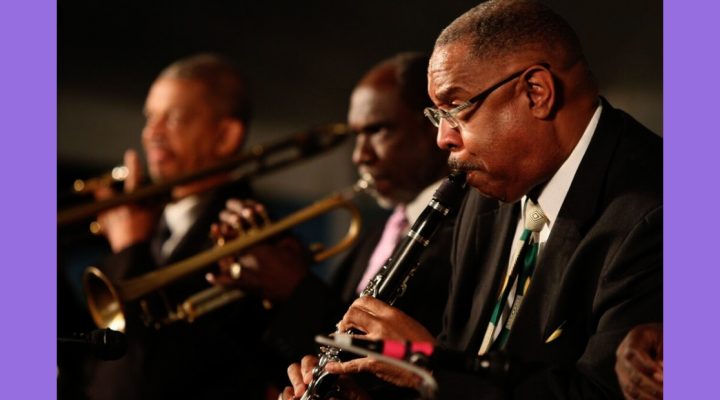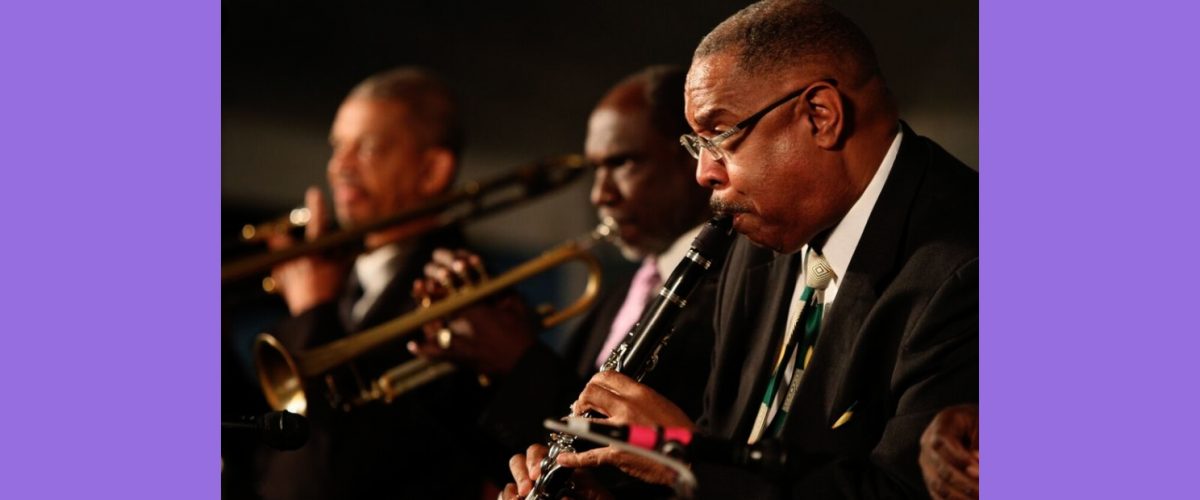In a way, St. Charles Avenue Baptist Church in New Orleans has two congregations, the one that shows up most weeks for worship and the one that attends its annual jazz worship service held the Sunday before Mardi Gras.
The Feb. 11 event will mark the 30th anniversary of the service led by renowned New Orleans jazz bandleader Michael White and his seven-piece band. During the liturgy, they perform jazz versions of hymns such as “What a Friend We Have in Jesus,” “Leaning on the Everlasting Arms” and Down by the Riverside.”
“They perform different pieces each year, but they always close with ‘When the Saints Go Marching In,’” said Marc Boswell, interim and administrative pastor of the church, which is a partner of the Alliance of Baptists and American Baptist Churches USA.
The weaving together of jazz and traditional worship has become a meaningful tradition for St. Charles members and for its neighbors in the Uptown section of New Orleans, where most Mardi Gras-related celebrations occur.

Marc Boswell
“There are people in our community who are not necessarily religious in conventional terms, who will be here for this service,” Boswell said. “All our congregation will be there and even more than that will be here from the wider community.”
The Sunday before Mardi Gras, also known as Thoth Sunday, arrives after weeks of boisterous observances leading into the raucous celebrations of Fat Tuesday, which is the last day before Lent. “Sunday is a big parade day in the city. They are some of the biggest parades. It’s why we bumped up our start two hours to 9 a.m.,” Boswell said
The tradition of holding a jazz service on that Sunday began in 1994 when a church member, who worked with White, invited him to perform.
“He was happy to do that and of course the congregation was delighted,” Boswell said. “A lot of people showed up because Dr. White has such a large following and is renowned throughout the city.”
For White, the inspiration for performing at St. Charles Baptist, from the beginning to now, has been both musical and spiritual.
“It’s almost like acknowledging the creator and asking for a blessing. It’s a coming together and sharing of joy and togetherness and a moment of reflection before the more raucous parts of the celebration begin,” said White, a New Orleans-based composer, clarinetist, jazz historian, musicologist and educator.

Michael White (left)
White, who is Catholic, said the St. Charles event also serves as a reminder there is more to the Mardi Gras season than partying. “It’s a good way to gather and talk and celebrate in ways they don’t quite do in the parades and other things.”
Jazz is an ideal musical form for the occasion because its origins have deep spiritual roots, he added. “The emotion and spirit of church hymns were what some of the earliest jazz musicians were trying to incorporate into their music.”
White said he is composing a new hymn to mark the 30th anniversary of jazz worship at St. Charles. “For some people, including myself, it’s the highlight of Mardi Gras.”
Providing that experience for the congregation and neighbors has been intentional at St. Charles, Boswell said.
“Elizabeth Lott, our former pastor, used to say this is her Mardi Gras congregation, because we see the same faces year after year. It’s also almost like a Christmas and Easter service, with people who come out on this particular day but don’t come to any other service.”
Yet a true spirit of fellowship has developed among those who attend the annual jazz service, with once-a-year participants looking forward to those they haven’t seen for 12 months, Boswell said. “This matters to folks. We see that. There is a real sense of community, a feeling that they are a part of something every Sunday before Mardi Gras.”
And for that reason, the church considers the jazz service an opportunity to meet and serve its neighbors without expectations that they should or will become members. It’s an acknowledgment that God can work through any form of cultural expression, Boswell said.
“It’s missional in the sense of meeting people where they are and how they respond in terms of culture. It is a powerful way to provide an opportunity to engage people in a form they relate to — jazz — but is still worshipful. That’s something we’re always trying to do at St. Charles.”


